
- This event has passed.
Forum 2020
July 13, 2020 @ 7:00 am – July 24, 2020 @ 7:00 pm EST
About the Forum
SAFSF amplifies the impact of philanthropic and investment communities in support of just and sustainable food and agriculture systems, and the SAFSF Forum is the only national gathering for and by funders supporting just and sustainable food systems change. The Forum challenges participants to understand the need for grantmakers and investors to take on risks in order to co-create more resilient, sustainable, and equitable food systems—and at the same time, provides space to cultivate connections with peers so that no one organization is going it alone.
The SAFSF Forum is moving online to bring you the opportunities for real-life learning and peer connection that funders look forward to all year. Spanning two weeks, from July 13-24, the 2020 SAFSF Forum is a curated assortment of thought-provoking, timely, and diverse programming developed by your SAFSF funder peers. With a range of workshop and networking sessions offered over two weeks, put together the schedule that works for your learning:
- Tune in live and participate in dynamic discussions with expert speakers
- Listen to session recordings at a time that works for you
- Connect and network with funder and investor peers working across the country
And because the Forum theme and agenda is developed by and for funders who are working on a variety of issues, approaches, and geographies, attendees will leave with inspiration, strategies, and connections for impactful engagement related to their own work within the food system.
Forum Theme
The 2020 Forum theme, Fields of Vision: Building on Our Assets for Resilient Food Systems, encourages participants to explore our fields of view by:
- Focusing on immediate critical needs and assets
- Looking beyond our own organizations and localities to build relationships with strategic allies and partners
- Zooming out to map the complex systems and leverage points that will support health, equity, solidarity, and resilience widely and for the long term
Forum offerings will reflect on this theme and be informed by the impacts of the coronavirus pandemic on our food and agricultural systems.
Registration Rates
$250 SAFSF Member | $325 Non-Member Funder | $250 Food System Partner* | $250 Affinity Group Staff
* Food System Partner registration is a member benefit. Email [email protected] if you have questions about this member benefit.
Who is a “Funder?”
The annual SAFSF Forum is designed by and for funders. Funders are considered those organizations using grantmaking or investments as a core strategy to fulfill their mission and who make grants or invest more than $50,000 annually. This includes individual donors, executive and program staff, and members of the board of grantmaking organizations (family foundations, individual donors, corporate foundations, government, community foundations, etc.), as well as representatives of non-profit or for-profit investment enterprises. Development or fundraising staff are not permitted to participate in SAFSF events.
2020 Forum Planning Committee
J. Olu Baiyewu, Food Well Alliance, GA
Alyssa Banks, Greater Twin Cities United Way, MN
Ila Duncan, The Lumpkin Family Foundation, NY
Devin Foote, W.K. Kellogg Foundation, MI
Leslie Hatfield (chair), GRACE Communications Foundation, NY
Christine James, The John Merck Fund, MA
Bob Scowcroft, The Nell Newman Foundation, CA
Elizabeth Stewart Burger, The Sunflower Foundation, KS
Jeff Usher, Kansas Health Foundation, KS
Gwen Wurst, Greater Kansas City Community Foundation, MO
Program
Week 1: Monday, July 13 – Friday, July 17
Monday 7/13
7 AM HST | 9 AM AKDT | 10 AM PT | 11 AM MT | 12 PM CT | 1 PM ET (90 min)
Transformational Food Systems Philanthropy
How can foundations and investors seize this moment to shift power that can lead to the true democratization of agricultural production, food systems, and philanthropy?
Presented by: SAFSF The extraction and concentration of resources––land, wealth, power––by a relative few is at the root of many of today’s agriculture, climate, and food system challenges; the COVID-19 pandemic has only intensified those challenges. Resource concentration is also the foundation of our century-old system of philanthropy and a key feature of our national and global economies. The pandemic has spurred some in philanthropy to shift more resources and power to communities while in rapid-response mode. How can foundations and investors seize this moment to shift power that can lead to the true democratization of agricultural production, food systems, and philanthropy?
Moderator: Christine James, executive director, The John Merck Fund, VT Speakers: Ellen Dorsey, executive director, Wallace Global Fund, DC
Rodney Foxworth, chief executive officer, Common Future, CA
9:30 AM HST | 11:30 AM AKDT | 12:30 PM PT | 1:30 PM MT | 2:30 PM CT | 3:30 PM ET (90 min)
Barriers for U.S. Farmers and Ranchers
A deep dive into key barriers for farmers and ranchers to transition towards regenerative practices and highlighting funding levers that can have the most impact.
Presented by: Patagonia
As part of investing Patagonia’s 2019 $10 million tax break dollars, we have worked for the past year to develop a landscape analysis of the key barriers for farmers and ranchers face in transitioning towards regenerative practices nationally. Using an interview-driven research process (with over 300 interviews), we identified key levers that might alleviate these barriers and, subsequently, where current and future funding from philanthropic funders can have the most impact within this context. The goals of this session will be to share the analysis to drive increased collaboration and systems thinking amongst funders and key stakeholders.
Moderator:
Jennifer O’Connor, founder, chief strategist, Guidelight Strategies, CA
Speakers:
Sarah Ebe, environmental grants program officer, Patagonia, CA
Torri Estrada, executive director, Carbon Cycle Institute, CA
David Lezaks, senior fellow, Croatan Institute, MI
Jonathan Lundgren, director, chief scientist, Ecdysis Foundation, SD
Ian McSweeney, director, Agrarian Trust, NH
Amy Saltzman, program officer, environment, Walton Family Foundation, CO
Dennis Derryck, Black Farmer Fund, NY
Onika Abraham Lee, Black Farmer Fund, NY
Tuesday 7/14
10 AM HST | 12 PM AKDT | 1 PM PT | 2 PM MT | 3 PM CT | 4 PM ET (60 min)
Reporting on Sustainable Agriculture in Rural America During COVID-19
A look at the challenges of covering alternative and sustainable practices and reporting on Big Ag during this complex time.
Presented by: Nell Newman Foundation, GRACE Communications Foundation, and The 11th Hour Project
Reporting on agriculture in rural “news deserts” was a complex endeavor before the pandemic. Now, the remaining media sources in these areas face a whole new set of hurdles. On top of agricultural consolidation, and powerful agribusinesses, the landscape now includes everything from COVID hotspots to gaps (and bottlenecks) in the supply chain and radical shifts in markets. We’ll also talk about:
* How to get a wider range of voices included in rural media.
* Covering regenerative/alternative/sustainable production methods in Big Ag country.
* Working within the current context of media bashing.
* Other risks and opportunities.
Moderators:
Twilight Greenaway, contributing editor, Civil Eats, CA
Bob Scowcroft, trustee, Nell Newman Foundation, CA
Speakers:
Sylvia Burgos Toftness, podcast host and farmer, Deep Roots Radio and Bull Brook Keep Farm, WI
Chris Clayton, ag policy editor, DTN Progressive Farmer, IA
Art Cullen, editor, Storm Lake Times, IA
Wednesday 7/15
6 AM HST | 8 AM AKDT | 9 AM PT | 10 AM MT | 11 AM CT | 12 PM ET (60 min)
Lasting Resilience: Raising Animals Agroecologically from the Mongolian Steppes to the Navajo Nation
Featuring experiences with nomadic pastoralists across Central Asia and Navajo sheep and goat herders, this session explores culturally-embedded agroecological livestock management and local food sovereignty.
Presented by: Agroecology Fund, Casey and Family Foundation, Panta Rhea Foundation, Thread Foundation, and Funders for Regenerative Agriculture (FORA)
In these uncertain times, sustainable livestock rearing must be more than technical. Scientists and agronomists have much to learn from indigenous herders whose practices are embedded in cultural traditions and rituals, ensuring their rootedness and longevity. The Peace Building Center works with nomadic pastoralists across Central Asia to restore indigenous cattle and horse populations under threat of extinction. In Indian Country in North America, the Dine’ (Navajo) work with sheep and goat herders to link Allan Savory methods with traditional ecological practices. This session will explore how systems, rooted in indigenous knowledge, can inform agroecological livestock management and food sovereignty.
Moderator:
Daniel Moss, executive director, Agroecology Fund, MA
Speakers:
Indira Raimberdy, executive director, Peace Building Center, Kyrgyzstan
Janene Yazzie, sustainable development program coordinator, International Indian Treaty Council, AZ
10 AM HST | 12 AM AKDT | 1 PM PT | 2 PM MT | 3 PM CT | 4 PM ET (60 min)
Networking Session
Connect with funder and investor peers, speaker partners, and Food System Partners during this networking opportunity.
Hosted by: SAFSF
Thursday 7/16
7:30 AM HST | 9:30 AM AKDT | 10:30 AM PT | 11:30 AM MT | 12:30 PM CT | 1:30 PM ET (75 min)
Food Health, Land Health: Exploring Collaboration Between Sustainable Food and State Wildlife Agencies
This session will explore the potential for collaboration between the nation’s state wildlife agencies and sustainable food system funders.
Presented by: Missouri Department of Conservation
The goal of this session is to explore potential for collaboration between sustainable food funders and the nation’s state wildlife agencies. It will include:
*Overview from the Director of the Missouri Department of Conservation (MDC), about why her agency seeks such collaboration. MDC is one of the nation’s leading state wildlife agencies.
* Briefing of Audubon’s Conservation Ranching program. launched in partnership with MDC, and now national in scope, as an innovative example of conservation friendly agriculture.
* Feedback for a report MDC commissioned to forge partnership with sustainable food organizations and present the Association of Fish and Wildlife agencies nationally.
Moderator:
Max Alleger, regional administrator, Missouri Department of Conservation, MO
Speakers:
Marshall Johnson, vice president, Audubon Conservation Ranching, National Audubon Society, ND
Sara Parker-Pauley, director, Missouri Department of Conservation, MO
Friday 7/17
6 AM HST | 8 AM AKDT | 9 AM PT | 10 AM MT | 11 AM CT | 12 PM ET (60 min)
Demystifying “Market Rate” Rate Returns in Food & AG
In this session we will illuminate a common blindspot of many impact-anchored professionals by pulling the sheet off of the concept and term “market rate.”
Presented by: Kinship Foundation, Torana Group, and Lumpkin Family Foundation
As funders expand their toolkits to include impact investments, “market rate” pops up in various contexts – sometimes as a reason to not invest (“they can’t generate market rate returns”) or to not grant (“they already generate market rate performance”). In many circumstances, the term is applied in a clouded and sometimes misrepresented way.
What does the term “market rate” actually mean? Who does it actually include? Why does it matter for professional grantmakers to understand market rate performance, especially in food & agriculture?
Moderator:
Lenore Beyer, director of conservation initiatives, Kinship Foundation, IL
Speakers:
Toyin Kolawole, founder & CEO, Iya Foods, IL
Andrea Longton, lender, Opportunity Finance Network, NY
Malini Ram Moraghan, managing director, Torana Group, IL
Week 2: Monday, July 20 – Friday, July 24
Monday 7/20
7 AM HST | 9 AM AKDT | 10 AM PT | 11 AM MT | 12 PM CT | 1 PM ET (90 min)
Risk, Return, and Impact: Funding Equitable Food Oriented Development in the Real World
Apply equitable funding and investment principles to case study projects, utilizing a new, urgently-needed model to support power- and wealth-building through community food systems change.
Presented by: The Kresge Foundation
“Power concedes nothing without a demand,” said Frederick Douglass. Food justice work grew from an understanding that food was one marker of inequitable systems that have been built to concentrate wealth and power. The emerging field of Equitable Food Oriented Development (EFOD) is a practitioner-activist-led and funder-allied strategy that centralizes the urgency of power- and wealth-building to community food systems change.
With its own recently released funding prototype opportunity, the EFOD Collaborative is designing equitable and practitioner-focused funding and investment principles. Session participants will learn and co-create alongside practitioner leaders, workshopping case studies and applying EFOD principles to potential investments.
Moderator:
Stacey Barbas, senior program officer – health, The Kresge Foundation, MI
Speakers:
Krysten Aguilar, co-executive director, La Semilla Food Center, NM
Trisha Chakrabarti, manager, equitable food oriented development, DAISA Enterprises, NY
Rudy Espinoza, executive director, Inclusive Action for the City, CA
Haleh Zandi, co-founder and co-director, Planting Justice, CA
Tuesday 7/21
7 AM HST | 9 AM AKDT | 10 AM PT | 11 AM MT | 12 PM CT | 1 PM ET (60 min)
Investing in Change: Foundation Support for Lobbying and Other Advocacy
Learn how, in this critical moment, foundations can—and should—engage in advocacy themselves and fund NGOs to advocate on their issues.
Presented by: The John Merck Fund
Especially in times of crisis like now, foundations can—and should—engage in advocacy themselves and fund NGOs to advocate on their issues. We will cover how your foundation can safely engage in advocacy and best practices for providing grantees flexibility under the law for their advocacy efforts. This session will cover:
* The various advocacy roles foundations can play;
* What constitutes advocacy and public policy work;
* The tax code’s definitions of lobbying, and their exceptions;
* Rules for how private & public foundation can fund NGOs that lobby; and
* Grant agreement language that permits support for policy work.
Moderator:
Christine James, executive director, The John Merck Fund, VT
Speakers:
Lisa Fernandes, communications director, Food Solutions New England at UNH Sustainability Institute, ME
Ronnie Pawelko, senior counsel, Alliance for Justice/Bolder Advocacy, DC
2 PM HST | 4 PM AKDT | 5 PM PT | 6 PM MT | 7 PM CT | 8 PM ET (120 min)
*NEW* Crafting Fun with Cocktails or Mocktails
SAFSF has, for many years, had a tradition of welcoming those among us who are crafters to bring their crafts – knitting needles, needlepoint, crochet, and more – to our tables when we meet in person. This year, we want to gather once again and see what folks are working on, hear about the projects you want to start, and just share some time together.
So we hope you will join us for an informal, not scripted (or facilitated) couple of hours to just hang out. Just bring yourself and whatever else you might need, a beverage (or not) of your choice. See you then we hope! Join at whatever time during this two-hour block that works for you!
Presented by: SAFSF
Wednesday 7/22
8 AM HST | 10 AM AKDT | 11 AM PT | 12 PM MT | 1 PM CT | 2 PM ET (60 min)
Collaborating for Food and Farm Movement Leadership
Leader-full movements require building power, skills, and relationships. Hear from four distinct and complementary fellowship programs investing in food systems leadership both regionally and nationally.
Presented by: Presented by GRACE Communications Foundation, Panta Rhea Foundation, and North Star Fund
Leadership matters. Funders have increasingly been investing in leadership development, so what can we learn from it? How are the various fellowships collectively working to build a more just food system? What challenges, and hope, do they hold? This session will bring together both regional and national fellowship programs including the Castanea Fellowship, HEAL Food Alliance’s School of Political Leadership (SoPL), the Hawaii Alliance for Progressive Action’s Kuleana Academy, and the Seeding Power Fellowship to openly engage, discuss, and share how they are cultivating leadership to bring forth food system change in empowering ways.
Moderator:
Anna Lappé, director of the food and democracy program, Panta Rhea Foundation, CA
Speakers:
Anne Frederick, executive director, Hawaiʻi Alliance for Progressive Action (HAPA), HI
Navina Khanna, director, Health, Environment, Agriculture, Labor Food Alliance (HEAL), CA
Adam Liebowitz, Community Food Funders director, North Star Fund, NY
Farzana Serang, executive director, Castanea Fellowship, CA
Simran Noor, principal, Noor Consulting, NY
Thursday 7/23
6 AM HST | 8 AM AKDT | 9 AM PT | 10 AM MT | 11 AM CT | 12 PM ET (60 min)
Networking Session
Connect with funder and investor peers, speaker partners, and Food System Partners during this networking opportunity.
Hosted by: SAFSF
8 AM HST | 10 AM AKDT | 11 AM PT | 12 PM MT | 1 PM CT | 2 PM ET (60 min)
Leveraging Land Grant Institutions as a Force to Address Racism in the Food System
Let’s identify disparities across 1862, 1890, and 1994 land grant institutions and discuss strategies to leverage land grants in addressing racism in the food system.
Presented by: Center for Regional Food Systems at Michigan State University and the W.K. Kellogg Foundation
Land grant educators touch food system work in every U.S. county. The land grant system includes the 1862 (white-led), 1890 (historically black) and 1994 (tribal) universities. 1862 land grant institutions use white solutions to address food system challenges and resist programs that support food justice for those in low-income communities. This session will:
1) Identify disparities across 1862, 1890, and 1994 land grants;
2) Contrast land grant and non-profit educator perceptions of equity;
3) Discuss narratives of power-sharing and economic justice across land-grants; and
4) Identify strategies to leverage land grants as a food system force to address racism.
Moderator:
Kolia Souza, outreach specialist, MSU Center for Regional Food Systems, KS
Speakers:
Lindsey Lunsford, sustainable food system resource specialist, Tuskegee University, AL
Rich Pirog, director, MSU Center for Regional Food Systems, MI
Mekko Tyner, registrar, College of the Muscogee Nation, OK
Friday 7/24
6 AM HST | 8 AM AKDT | 9 AM PT | 10 AM MT | 11 AM CT | 12 PM ET (60 min)
The State of School Food and How We Can Plan for the Future
Join a discussion about the role of school food in the food system, the importance of healthy school meals, and how the pandemic has impacted school food.
Presented by: Chef Ann Foundation
Every day, 30 million children eat school lunch and for many students, these are the most nutritious meals of the day. 70% were eligible for free or reduced-price meals before the pandemic, and that number is only rising.
Join a discussion about the role of school food in the food system and the importance of healthy school meals. Our panel of journalists, policymakers, policy advocates, and school food professionals will discuss the impact of the pandemic and the needs of school districts. Finally, we will ask attendees to join us in a conversation about school food in the future.
Moderator:
Mara Fleishman, chief executive officer, Chef Ann Foundation, CO
Speakers:
Elizabeth Campbell, senior director, legislative and government affairs, Academy of Nutrition and Dietetics, DC
Ann Cooper, director of food services, Boulder Valley School District; founder and president, Chef Ann Foundation; partner, Lunch Lessons, LLC, CO
Anya Kamenetz, education correspondent, National Public Radio
Jerone Wiggins, director of educational programs and partnerships, Jones Valley Teaching Farm, AL
Speakers

Krysten Aguilar
co-executive director, La Semilla Food Center, NM
MONDAY, 7/20: RISK, RETURN, AND IMPACT: FUNDING EQUITABLE FOOD ORIENTED DEVELOPMENT IN THE REAL WORLD
Krysten Aguilar is the co-executive director at La Semilla Food Center. Krysten led the initiative to get the Las Cruces Urban Agriculture and Food Policy Plan passed – the first of its kind in New Mexico – and is now leading efforts for a county-wide healthy food financing initiative. She is one part of a four-woman leadership team, driving La Semilla’s mission of creating a fair and sustainable local food system and riding on the frontier of nonprofit development with an innovative leadership model, holistic programming, and using food systems work as a tool for racial and gender healing. Krysten holds a bachelor’s degree in wildlife and fisheries sciences from Eastern New Mexico University and a master’s degree in cultural anthropology from New Mexico State University.
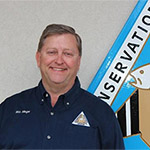
Max Alleger
regional administrator, Missouri Department of Conservation, MO
THURSDAY, 7/16: FOOD HEALTH, LAND HEALTH: EXPLORING COLLABORATION BETWEEN SUSTAINABLE FOOD AND STATE WILDLIFE AGENCIES
Max Alleger is the Regional Administrator Missouri Department of Conservation’s Southwest Region. He supervises regional-level public and private land management and infrastructure management branches and coordinates programs aimed at meeting the needs of the people and native species which share southwest Missouri’s landscape. Max served as the Department’s Grassland Coordinator Prior more than a decade. Before coming to the Department in 1995, Max worked for the Texas Agricultural Extension Service and as a partner in a family farm. He holds bachelor’s degrees in Agricultural Education and Fisheries & Wildlife Management from the University of Missouri-Columbia, and a Master’s in Wildlife Science from Texas A&M.

Stacey Barbas
senior program officer, The Kresge Foundation, MI
MONDAY, 7/20: RISK, RETURN, AND IMPACT: FUNDING EQUITABLE FOOD ORIENTED DEVELOPMENT IN THE REAL WORLD
Stacey Barbas is a senior program officer on the Kresge Foundation’s health team. She is responsible for managing a portfolio of approximately $20 million that focuses on increasing health equity by addressing conditions that lead to poor health outcomes. Her portfolio includes grants that address healthy food systems that benefit low-income communities, and she is a lead staff person on Fresh, Local, and Equitable, a $12 million initiative with the Foundation’s arts and culture program that funds projects around the country that use food-oriented programs to contribute to economic revitalization, cultural expression, and health in urban low-income communities. Stacey’s professional career in the nonprofit health and human service fields spans thirty years. She joined the Kresge Foundation in January 2008 after serving for five years as executive director of the Michigan AIDS fund, a statewide nonprofit grantmaking organization. She received a master of science in administration and management from Central Michigan University. She serves on the steering committee of the Sustainable Agriculture and Food System Funders and chairs the Policy Committee.
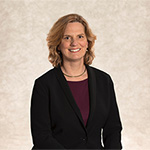
Lenore Beyer
director of conservation programs, Kinship Foundation, IL
FRIDAY, 7/17: DEMYSTIFYING “MARKET RATE” RETURNS IN FOOD & AG
Lenore Beyer is the director of conservation programs at Kinship Foundation where she manages Food:Land:Opportunity, a multi-year initiative that looks to increase the supply of local food in the Chicago region, and supports the strategic planning for Kinship Conservation Fellows. Prior to joining Kinship, Lenore was the vice president of policy and planning at Openlands, a regional conservation land trust, where she planned and implemented Openlands’ policy and advocacy agenda and managed specific projects to protect land, water and natural resources. This included creation of the Hackmatack National Wildlife Refuge, integration of farmland protection with local food initiatives, and transforming Chicago schoolyards into greenspace. Lenore was previously the executive director of the Environmental Defenders of McHenry County, a citizen advocacy organization. She also served as president of the Illinois Environmental Council and on the Endangered Species Protection Board in Illinois. Lenore has a B.A. from Oberlin College and an M.B.A. from the University of Illinois.
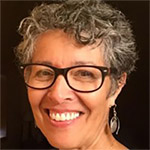
Sylvia Burgos Toftness
podcast host and farmer, Deep Roots Radio and Bull Brook Keep Farm, WI
Sylvia Burgos Toftness is a Latina baby boomer from the tenements of the South Bronx. Sylvia now raises 100% grass-fed beef in west-central Wisconsin with her husband Dave. They believe more people will choose to farm and eat healthful foods if they know the connections between what we eat and how it’s grown. That’s why they invite you to walk the fields with us; hear from experts on her Saturday morning show, Deep Roots Radio; share their adventures on their blog, From the Bronx to the Barn; and buy their sustainably-grown beef. They farm with a tiny carbon hoofprint (R) so that you can enjoy great-tasting grass-fed beef that’s high in nutrition while helping to restore our environment.
Sylvia serves on the board of the Farm Table Foundation and on the board of MOSES (the Midwest Organic and Sustainable Agriculture Services nonprofit).
Elizabeth Campbell
senior director, Legislative and Government Affairs, Academy of Nutrition and Dietetics, DC
FRIDAY, 7/24: THE STATE OF SCHOOL FOOD AND HOW WE CAN PLAN FOR THE FUTURE

Trisha Chakrabarti
manager, equitable food oriented development, DAISA Enterprises, NY
MONDAY, 7/20: RISK, RETURN, AND IMPACT: FUNDING EQUITABLE FOOD ORIENTED DEVELOPMENT IN THE REAL WORLD
Trisha Chakrabarti is leading DAISA Enterprises’ work to explore Equitable Food-Oriented Development as a practice and EFOD organizations on the ground. that do this work on the ground. DAISA Enterprises works alongside community organizations and social entrepreneurs that are innovating to build a better, more equitable, food system, and their investors. Trisha has worked in community food programming, statewide policy advocacy, and has led participatory food access research initiatives with restaurant workers and systems-impacted youth. She grew up in the South Asian diaspora, and sees a community-owned food system as a key indicator of political and economic self-sovereignty. Trisha serves on the Business and Strategy Board of the Central Brooklyn Food Cooperative. She holds a BA in Political Economy from UC Berkeley, and Masters Degrees in Food Policy and Public Health from Tufts University, where she was a Block Direct Service Fellow.

Chris Clayton
ag policy editor, DTN Progressive Farmer, IA
TUESDAY, 7/14: REPORTING ON SUSTAINABLE AGRICULTURE IN RURAL AMERICA DURING COVID-19
Chris Clayton has been writing and editing for DTN/The Progressive Farmer since 2005 after working more than seven years as a reporter for the Omaha World-Herald. He is the author of The Elephant in the Cornfield: The Politics of Agriculture and Climate Change.
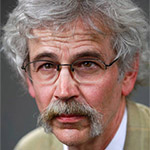
Art Cullen
editor, Storm Lake Times, IA
TUESDAY, 7/14: REPORTING ON SUSTAINABLE AGRICULTURE IN RURAL AMERICA DURING COVID-19
Art Cullen is a Pulitzer Prize-winning journalist, editor of The Storm Lake Times (a family-run weekly newspaper in small-town Iowa), and author of the new book, Storm Lake: A Chronicle of Change, Resilience, and Hope from a Heartland Newspaper.
Ann Cooper
director of food services, Boulder Valley School District; founder and president, Chef Ann Foundation; partner, Lunch Lessons, LLC, CO
FRIDAY, 7/24: THE STATE OF SCHOOL FOOD AND HOW WE CAN PLAN FOR THE FUTURE
Chef Ann Cooper is an internationally recognized author, chef, educator, public speaker, and advocate of healthy food for all children. In a nation where kids are born with shorter estimated life expectancies than their parents due to diet-related disease, Chef Ann has been a constant champion of school food reform as an important avenue through which to improve childhood nutrition.
In 2009, Chef Ann founded the Chef Ann Foundation, a nonprofit organization dedicated to helping schools take action so that every child has daily access to fresh, healthy food.
Also known as the “Renegade Lunch Lady,“ Chef Ann serves as Director of Food Services for Boulder Valley School District in Boulder, Colorado, and is Partner of Lunch Lessons, LLC, a consultancy for school districts going through large-scale food change. Ann attends many national conferences and performs regular Speaking Engagements. Visit our Multimedia Center to view some of Ann’s notable lectures, including several TED Talks.
A graduate of the Culinary Institute of America, Ann has 40 years of experience as a chef, including 17 years in school food programs. Her books Bitter Harvest and Lunch Lessons: Changing the Way We Feed Our Children have made her a leading advocate for safe, sustainable food. To raise further awareness about the value of healthy food systems, Chef Ann has held several advisory positions:
– Executive committee member, Chefs Collaborative
– Fellow, W.K. Kellogg Foundation Food & Society Policy
– Board member, USDA’s National Organic Standards Board (by congressional appointment)
– Member, Google Innovation Lab for Food Experiences
– President and board member, Women’s Chefs and Restaurateurs
– President, American Culinary Federation of Central Vermont
– Advisory Board Member, Real Food for Kids
Chef Ann has also been honored by the National Resources Defense Council, awarded an honorary doctorate from SUNY Cobleskill for her work on sustainable agriculture, and received IACP’s 2012 Humanitarian of the Year award. Named one of the “Influential 20” by Food Service Director Magazine and one of the top 15 Crusaders for Health in the Food Industry by Greatist.com, Ann has also received the Women Chefs and Restaurateurs’ Community Service Award and a Special Inspirational Award from the Susan B. Komen Foundation. In 2016, she was named “One of the Top 50 Food Activists” by the Academy of Culinary Nutrition.
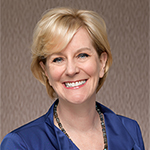
Ellen Dorsey
executive director, Wallace Global Fund, DC
MONDAY, 7/13: TRANSFORMATIONAL FOOD SYSTEMS PHILANTHROPY
Ellen Dorsey is Executive Director of the Wallace Global Fund, a private foundation focused on progressive social change in the fields of environment, democracy, human rights and corporate accountability. Under her leadership, the Fund is recognized for creative philanthropic strategies and mission-related investing. This alignment of programs and investments led the foundation to support the fossil fuel divestment movement since its inception and to launch a new global campaign, Shine, to end energy poverty. Dorsey was awarded the 2016 inaugural Nelson Mandela – Graca Machel Brave Philanthropy Award for launching Divest-Invest Philanthropy, a coalition of over 170 foundations committed to deploying their investments to address the climate crisis and accelerate the clean energy transition.
Dr. Dorsey came to Wallace Global Fund from a series of academic, philanthropic and non-profit leadership positions in the human rights and environmental fields, including serving as Executive Director at the Rachel Carson Institute, launching the Human Rights and Environment program at Amnesty International, and serving as senior program officer in the Heinz Endowment’s Environment Program.
Additionally, she has served on the board of numerous non-profit organizations promoting human rights and sustainable development, including Greenpeace USA, the Global Initiative for Economic, Social and Cultural Rights, the United States Human Rights Network, and chair of the board of Amnesty International USA.
Dorsey holds a doctorate in political science from the University of Pittsburgh. She was a Fulbright Research Fellow in South Africa during that country’s historic transformation. She served on the faculty of several Universities, teaching human rights and environmental sustainability. She has written extensively on effective strategies of non-governmental organizations and social movements. Dorsey is co-author, with Paul J. Nelson, of New Rights Advocacy: Changing Strategies of Development and Human Rights NGOs, Georgetown University Press, 2008.
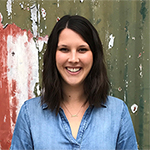
Sarah Ebe
environmental grants program officer, Patagonia, CA
MONDAY, 7/13: BARRIERS FOR U.S. FARMERS AND RANCHERS TO ADOPT REGENERATIVE AG PRACTICES: KEY LEVERS & OPPORTUNITIES
Sarah Ebe serves as Patagonia’s environmental grants program officer. Within the sustainable agriculture space, Patagonia focuses funding on supporting the enabling conditions to advance to a regenerative agriculture economy, one that places the highest importance on soil health, animal welfare, and social justice.

Rudy Espinoza
executive director, Inclusive Action for the City, CA
MONDAY, 7/20: RISK, RETURN, AND IMPACT: FUNDING EQUITABLE FOOD ORIENTED DEVELOPMENT IN THE REAL WORLD
Rudy Espinoza is the Executive Director of Inclusive Action for the City, a community development organization designing innovations to responsibly revitalize low-income, urban areas. He specializes in designing economic development initiatives in low-income communities, researching the informal economy, building private/nonprofit partnerships, and training the working poor to participate in the socio-economic revitalization of their neighborhoods.
At Inclusive Action, he leads their advocacy efforts in support of the working poor and their micro-finance programs that support micro-entrepreneurs. Under his leadership, Inclusive Action helped legalize street vending in Los Angeles, has deployed over $500,000 in low-interest micro-loans to under-served entrepreneurs, and co-created a unique commercial real estate initiative that preserves small businesses in gentrifying neighborhoods.
He serves as the President of the East Area Planning Commission for the City of Los Angeles as well as the Board Chair of the LA Food Policy Council. He also serves on the Board of Directors of the Center for Nonprofit Management and the Advisory Boards of the LA Development Fund and Investing in Place. Rudy holds degrees in Business Administration and Urban Planning.
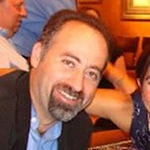
Torri Estrada
executive director, Carbon Cycle Institute, CA
MONDAY, 7/13: BARRIERS FOR U.S. FARMERS AND RANCHERS TO ADOPT REGENERATIVE AG PRACTICES: KEY LEVERS & OPPORTUNITIES
Torri Estrada is Executive Director at CCI and directs its policy and climate justice work. Torri has worked with non-profit, community-based, and public institutions to advance solutions to social and environmental justice, climate, and environmental issues for over twenty years. Previously, Torri was the program director at the Marin Community Foundation, where he managed the Foundation’s environmental grantmaking program and climate change initiative. He was also a program officer at the Unitarian Universalist Veatch Program at Shelter Rock, where he managed its environmental justice, media reform, reproductive rights, and civil rights portfolios. Torri was the co-founder and a senior policy fellow with the Environmental Justice Coalition for Water; served as Director of the Latino Issues Forum’s Environment and Sustainable Development Program; and was a Program Director at Urban Habitat, where Torri managed the Brownfields and Community Revitalization Project and co-developed its Leadership Development Program. Torri holds an MS in Environmental Sociology and Policy (with an emphasis on environmental justice) from the University of Michigan.
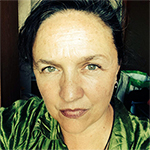
Lisa Fernandes
communications director, Food Solutions New England at UNH Sustainability Institute, ME
TUESDAY, 7/21: INVESTING IN CHANGE: FOUNDATION SUPPORT FOR LOBBYING AND OTHER ADVOCACY
Lisa M. Fernandes currently serves as the Communication Director for the Food Solutions New England network at the UNH Sustainability Institute in Durham, NH, helping to build a just, healthy & sustainable regional food system. In 2005, Lisa founded The Resilience Hub in Portland, Maine and over 13 years, grew it to nearly 3,000 members, delivering over 800 community-building and educational events. As an experienced strategist, facilitator, speaker, network weaver and educator, Lisa believes that resilience-building, community connectivity and participatory design are among the best approaches for creating vibrant futures and navigating current challenges. She has served the boards of the Eat Local Foods Coalition, the Permaculture Association of the Northeast, the Grantmaking Committee of the New England Grassroots Environment Fund, and on the Advisory Panel for Green & Healthy Maine Homes magazine. A Master Food Preserver and Master Composter, Lisa has also been active in the Portland Mayor’s Initiative for Healthy Sustainable Food Systems, Maine Organic Farmers & Gardeners’ Ag Services Committee, the Portland Food Coop, Hour Exchange Portland. She attended Boston College and Evergreen State College and has a rich set of work experiences, including several years owning/operating a software firm with 100+ client companies across the region.
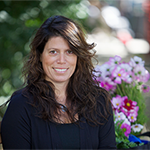
Mara Fleishman
chief executive officer, Chef Ann Foundation, CO
FRIDAY, 7/24: THE STATE OF SCHOOL FOOD AND HOW WE CAN PLAN FOR THE FUTURE
Mara Fleishman serves as the CEO of the Chef Ann Foundation (CAF), an organization founded in 2009 to focus on solutions to the school food crisis. After becoming involved in school food as a concerned parent, Mara served on the Chef Ann Foundation’s board of directors, and she later transitioned to executive director in March of 2013. Mara has nearly 20 years of experience working in natural products including 12 years with Whole Foods Market, where she served most recently as global director of partnerships. In addition to CAF, she has held board seats at The Growe Foundation, the Kitchen Community, and Naturally Boulder.

Rodney Foxworth
chief executive officer, Common Future, CA
MONDAY, 7/13: TRANSFORMATIONAL FOOD SYSTEMS PHILANTHROPY
A nonprofit leader and social entrepreneur, Rodney Foxworth is CEO of Common Future, formerly known as BALLE, a network of leaders (re)building an economy that includes everyone. Common Future’s work unites wealth-holders and wealth-builders across the U.S. and Canada to advance a more equitable economy.
Notably, Rodney has shared the stage with field leaders and spoken at the AEO Conference, Conscious Company Global Leaders Forum, Mission Investing Institute, Social Finance Forum, Confluence Philanthropy Convening, Open Markets Institute, Skoll World Forum, and Global Philanthropy Forum.
Previously, he was CEO and Founder of Invested Impact, a consulting firm focused on economic development, philanthropy, and social innovation, and co-founder and Strategy Advisor of Impact Hub Baltimore. Prior to founding Invested Impact, Rodney was community manager at BMe, a national network of black male leaders and entrepreneurs. Rodney has also served as program manager at Job Opportunities Task Force, a policy advocacy and workforce development organization. Additionally, he has been a consultant to the Annie E. Casey Foundation, Calvert Impact Capital, and the John S. and James L. Knight Foundation, among others.
Rodney is a BALLE Fellow, Next City Vanguard, and Baltimore Business Journal “40 under 40” honoree. He is featured in the Washington Post bestseller, “Reach: 40 Black Men Speak on Living, Leading, and Succeeding.” Rodney serves on the board of Justice Funders, SOCAP, and NFF.

Anne Frederick
executive director, Hawaiʻi Alliance for Progressive Action (HAPA), HI
WEDNESDAY, 7/22: COLLABORATING FOR FOOD AND FARM MOVEMENT LEADERSHIP
Anne Frederick is the Executive Director of the Hawaiʻi Alliance for Progressive Action (HAPA), a Hawaiʻi-wide organization whose mission is to catalyze community empowerment and systemic change towards valuing ʻāina (environment / that which feeds us) and people ahead of corporate profit. HAPA’s work grows out of the movement to regulate the agrochemical industry and pesticide impacts in Hawaiʻi. Anne also works in support of the transition towards just and regenerative food systems in Hawaiʻi, by regularly engaging in community-based mālama ʻāina work days, and helping to steward a nine acre family farm/homestead in Anahola, Kauaʻi. Prior to working at HAPA, Anne co-founded and ran the community planning and design non-profit organization, Hester Street in 2001 on the Lower East Side of Manhattan where she worked on a variety of land-use campaigns locally and citywide.
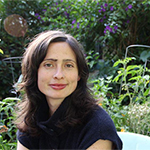
Twilight Greenaway
contributing editor, Civil Eats, CA
TUESDAY, 7/14: REPORTING ON SUSTAINABLE AGRICULTURE IN RURAL AMERICA DURING COVID-19
Twilight Greenaway is an editor at and regular contributor to Civil Eats. She has overseen the rural coverage on the site since 2017. He writing has appeared in the New York Times, NBC News, The Guardian, Mother Jones, and numerous other publications.
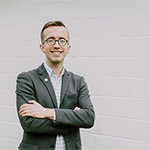
Joey Hentzler
director of advocacy, The Kansas Appleseed Center for Law and Justice, KS
WEDNESDAY, 7/22: FUNDING A STATEWIDE FOOD SYSTEMS MOVEMENT THROUGH COVID AND BEYOND: THE KANSAS STORY
Joey Hentzler has worked in anti-hunger advocacy since joining Appleseed in 2017. In his position as Director of Advocacy, he supports a team of advocates organizing communities to implement child nutrition programs like the Summer Meal Service Program and universal meal programs like Community Eligibility Provision. He also supports statewide collaborations to build sustainable advocacy infrastructure in Kansas, increase participation in school breakfast programs, and increase access to SNAP food benefits for eligible Kansans. Joey represents Appleseed in the statehouse advocating for anti-hunger policy reform. He has presented at several statewide and national conferences on Kansas Appleseed’s successful anti-hunger campaigns in rural communities and how to integrate community organizing strategies and policy advocacy into food systems work.
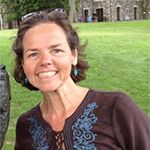
Christine H. James
executive director, The John Merck Fund, VT
MONDAY, 7/13: TRANSFORMATIONAL FOOD SYSTEMS PHILANTHROPY
TUESDAY, 7/21: INVESTING IN CHANGE: FOUNDATION SUPPORT FOR LOBBYING AND OTHER ADVOCACY
CHRISTINE H. JAMES is the executive director of The John Merck Fund. Christine came to The John Merck Fund in 2008 after 20+ years working for small, community-based human service and environmental nonprofit organizations in Maine and Massachusetts. She has a BA in art history from Bowdoin College and an MA in public policy from Tufts University’s Urban and Environmental Policy program. Just before coming to JMF, she was executive director of EarthWorks, a small urban greening organization based in the Roxbury neighborhood of Boston. Her work in Maine included four years as executive director of an educational organic farm and two years working on clean energy and climate change issues. Before becoming executive director, she was JMF’s director of programs from 2008 to 2017, when she oversaw the foundation’s environmental grants programs: Clean Energy, Health and the Environment, and Regional Food Systems.
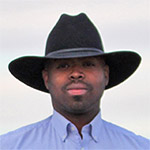
Marshall Johnson
vice president, Audubon Conservation Ranching, National Audubon Society, ND
THURSDAY, 7/16: FOOD HEALTH, LAND HEALTH: EXPLORING COLLABORATION BETWEEN SUSTAINABLE FOOD AND STATE WILDLIFE AGENCIES
Marshall Johnson serves as the Vice-President of the National Audubon Society, leading its market-based regenerative grazing efforts through the Conservation Ranching Initiative. For the past decade, he’s worked to build rural and urban community-focused habitat and ecosystem programs. Equipped with a business degree from the University of Minnesota, Marshall strives to bring conservation into the 21st century, creating eco-friendly supply chains and markets, and urban habitat initiatives driven by the ecosystem services they provide to communities.
Audubon’s Conservation Ranching Initiative brings farmers, ranchers, retailers and consumers together with grasslands, herds and birds into win-win alignment. The groundbreaking market-based Conservation Ranching Program now enrolls more than 2,500,000 acres across 75 ranches. Additionally, creating safe passage and respite for wildlife and wild humans within an urban context has been a priority of Audubon Dakota under Marshall’s leadership, with the program now managing the largest urban conservation program in the Northern Great Plains.
Anya Kamenetz
education correspondent, National Public Radio
FRIDAY, 7/24: THE STATE OF SCHOOL FOOD AND HOW WE CAN PLAN FOR THE FUTURE
Anya Kamenetz is an education correspondent at NPR. She joined NPR in 2014, working as part of a new initiative to coordinate on-air and online coverage of learning. Since then the NPR Ed team has won a 2017 Edward R. Murrow Award for Innovation, and a 2015 National Award for Education Reporting for the multimedia national collaboration, the Grad Rates project.
Kamenetz is the author of several books. Her latest is The Art of Screen Time: How Your Family Can Balance Digital Media and Real Life (PublicAffairs, 2018). Her previous books touched on student loans, innovations to address cost, quality, and access in higher education, and issues of assessment and excellence: Generation Debt; DIY U: Edupunks, Edupreneurs, and the Coming Transformation of Higher Education, and The Test.
Kamenetz covered technology, innovation, sustainability, and social entrepreneurship for five years as a staff writer for Fast Company magazine. She’s contributed to The New York Times, The Washington Post, New York Magazine and Slate, and appeared in documentaries shown on PBS and CNN.
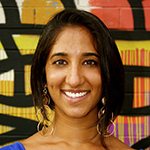
Navina Khanna
director, Health, Environment, Agriculture, Labor Food Alliance (HEAL), CA
WEDNESDAY, 7/22: COLLABORATING FOR FOOD AND FARM MOVEMENT LEADERSHIP
Navina Khanna is the Director of the HEAL (Health, Environment, Agriculture, Labor) Food Alliance, a national multi-sector, multi-racial coalition of food and farm justice organizations. She’s worked as an educator, community organizer, and policy advocate toward justice through transforming agri-food systems. Based in Oakland, Navina serves on the Board of Richmond’s Urban Tilth and organizes with #Asians4BlackLives. She is a Fellow at Movement Strategy Center, and in 2014, her work was recognized with a James Beard Leadership Award. Navina holds an MS in International Agricultural Development from UC Davis, where she co-developed the first undergraduate major in sustainable agriculture at a Land Grant University. A first-generation South Asian American, Navina’s worldview is shaped by growing up – and growing food – in India and the US.

Amir Kirkwood
chief lending and investment officer, Opportunity Finance Network, NY
FRIDAY, 7/17: DEMYSTIFYING “MARKET RATE” RETURNS IN FOOD & AG
Amir Kirkwood manages OFN’s Financial Services team and is responsible for development of new funds and resources to support OFN’s on and offbalance sheet financing activity. Amir comes to OFN from Amalgamated Bank, where he was First Vice President for Commercial Banking, covering community development finance and growth markets. In this role, he was a lead originator for mission focused lending to nonprofits, CDFIs, impact investment funds, and foundations, completing more than $100mm in approved transactions and originations. Also serving as Senior Advisor to the Amalgamated Foundation, he advised nonprofits, CDFIs, and investment funds on impact finance strategies.
Prior to Amalgamated Bank, Kirkwood served as a Partner at Next Street, playing various roles to support business development and client management. Earlier, he was a Director in Citigroup’s Municipal Securities
Division, working as a relationship banker for Citi Community Capital. He managed origination with municipal agencies, CDFIs, intermediary lenders, community development corporations, and nonprofits. While at Citi, and in partnership with OFN and Calvert Impact Capital, Kirkwood helped create the Communities at Work Fund, LP, a national $200 million commitment to finance the general operating needs of CDFIs.

Miranda Klugesherz
director, Kansas Alliance for Wellness, KC Healthy Kids, KS
WEDNESDAY, 7/22: FUNDING A STATEWIDE FOOD SYSTEMS MOVEMENT THROUGH COVID AND BEYOND: THE KANSAS STORY
Having grown up in a family below the poverty line, Miranda possesses first-hand experience of the health and environmental challenges faced by low-income individuals in their local food systems. She has dedicated her career to elevating the voices of socioeconomically and geographically disenfranchised individuals in the policies and systems which represent them. Miranda offers an informed perspective on the strengths of – and challenges faced by – rural communities seeking to ensure community members have access to a more healthy, equitable way of life. As Director of the Kansas Alliance for Wellness, she oversees a state-wide network of Kansas-based food, farm, and policy councils, and provides technical assistance to individual councils seeking to make sustainable change in their local communities around the environment, agriculture, health, and equity. Before coming to KC Healthy Kids, Miranda was appointed to chair the food policy council of Junction City, Kansas. She also co-founded Live Well Geary County, a nonprofit seeking to alleviate health and environmental barriers in one of the most impoverished counties in Kansas.
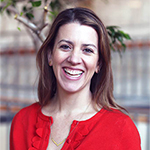
Anna Lappé
program director, food and democracy, Panta Rhea Foundation, CA
WEDNESDAY, 7/22: COLLABORATING FOR FOOD AND FARM MOVEMENT LEADERSHIP
ANNA LAPPÉ is a national bestselling author, an advocate for sustainability and justice along the food chain, and an advisor to funders investing in food system transformation. A James Beard Leadership Award recipient, Anna is the co-author or author of three books and the contributing author to more than a dozen others. Named one of TIME’s “eco” Who’s-Who, Anna is the founder or co-founder of three national organizations, including the Small Planet Institute, which she launched with her mother Frances Moore Lappé, and Real Food Media, which partners with food movement allies to develop communications strategy and critical analysis for systems change. As a funder, she has led the grantmaking of the Small Planet Fund for more than a decade and created and runs the Food & Democracy program of the Panta Rhea Foundation. Anna is a founding Steering Committee member of the Castanea Fellowship and serves on the Advisory Boards of the Food Chain Workers Alliance and the Food and Farm Communications Fund along with her board service at the Mesa Refuge and Rainforest Action Network. She lives in the San Francisco Bay Area with her husband and their two daughters.
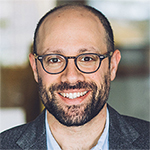
David LeZaks
senior fellow, Croatan Institute, MI
MONDAY, 7/13: BARRIERS FOR U.S. FARMERS AND RANCHERS TO ADOPT REGENERATIVE AG PRACTICES: KEY LEVERS & OPPORTUNITIES
David LeZaks, Ph.D., Senior Fellow, is an environmental scientist and financial activist whose work is centered around developing innovative mechanisms for financing the transition to agroecological farming and food systems.
Before joining Croatan Institute, Dr. LeZaks led the Regenerative Food Systems initiative at Delta Institute in Chicago, where he managed a portfolio of projects that focused on the design and deployment of disruptive mechanisms to unlock substantial capital flows into regenerative agriculture. Previously, he served as an RSF Social Finance Integrated Capital Institute fellow. Earlier in his career, David was a postdoctoral scientist at the University of Wisconsin – Madison, where he completed his Ph.D. in Environment and Resources and an M.S. in Land Resources. Afterward, he served as Managing Scientist of the Knowledge Systems for Sustainability Consortium and Program Director of the university’s Agricultural Innovation Prize. Currently, he serves in advisory roles to Mad Agriculture, the Savanna Institute, Nourishn, Council of Development Finance Agencies’ Food Systems Finance Advisory Council, and the Transformational Investing in Food Systems initiative, an allied initiative of the Global Alliance for the Future of Food.

Adam Liebowitz
Community Food Funders director, North Star Fund, NY
WEDNESDAY, 7/22: COLLABORATING FOR FOOD AND FARM MOVEMENT LEADERSHIP
ADAM LIEBOWITZ joined North Star Fund in 2013. He directs Community Food Funders (CFF), a philanthropic organizing project for funders in the NY-NJ-CT area to invest in the transition to an equitable, ecologically sound, and economically robust regional food system that emphasizes local growing, processing, and distribution. CFF facilitates roundtable discussions, funder briefings, site visits, collaborative projects, and social gatherings to foster information-sharing and networking among funders. Adam also administered and coordinated North Star Fund’s Greening Western Queens Fund and Community Fund for Sandy Recovery. Prior to joining North Star Fund, Adam worked as an independent consultant to nonprofit organizations and private firms specializing in food systems planning and food access projects in New York. Before that, he trained youth at The Point CDC in community organizing around environmental justice issues and led the organization’s policy and advocacy efforts. Adam created an urban agriculture and food justice program that included cooking and nutrition classes, public health outreach, the establishment of a local CSA, and vegetable gardens across multiple sites.
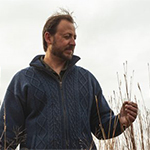
Jonathan Lundgren
director, chief scientist, Ecdysis Foundation, SD
MONDAY, 7/13: BARRIERS FOR U.S. FARMERS AND RANCHERS TO ADOPT REGENERATIVE AG PRACTICES: KEY LEVERS & OPPORTUNITIES
Dr. Lundgren is an agroecologist, Director ECDYSIS Foundation, and CEO for Blue Dasher Farm. He received his PhD in Entomology from the University of Illinois in 2004, and was a top scientist with USDA-ARS for 11 years. Lundgren received the Presidential Early Career Award for Science and Engineering by the White House. Lundgren has served as an advisor for national grant panels and regulatory agencies on pesticide and GM crop risk assessments. Lundgren has written 126 peer-reviewed journal articles, several book chapters, authored the book “Relationships of Natural Enemies and Non-prey Foods”, and has received more than $6 million in grants. He has trained 5 post-docs and 14 graduate students from around the world. One of his priorities is to re-envision how science is conducted to help fuel a revolution in regenerative agriculture. He regularly interacts with the public and farmers around the world regarding ecologically intensive farming and how diversity fuels the resilience and productivity of an agroecosystem and rural communities.
Lindsey Lunsford
sustainable food system resource specialist, Tuskegee University, AL
THURSDAY, 7/23: LEVERAGING LAND GRANT INSTITUTIONS AS A FORCE TO ADDRESS RACISM IN THE FOOD SYSTEM
Scholar activist and agriculture advocate, Dr. Lindsey Lunsford, inspired by her alma mater, Tuskegee University, is setting the tone for the upcoming generation of rural and urban agriculturalists. Dr. Lunsford is unique in that she worked full-time as a Sustainable Food System Resource Specialist through Tuskegee University’s Carver Integrative Sustainability Center, while still being enrolled in the Tuskegee University Integrative Public Policy and Development Doctoral Program. Dr. Lunsford’s doctoral research focused on the restorying of African American food systems and foodways for the pursuit of cultural justice and food sovereignty.
Although, still early in her career, Dr. Lunsford demonstrates noteworthy performance and accomplishments in her programming and research aims. Dr. Lunsford was recently named among the nation’s Top 40 Emerging Leaders in Food and Agriculture. Dr. Lunsford, currently studies policy advocacy for strengthening grassroots efforts from state to international levels. Lunsford’s leadership focuses on educating underserved populations on self-sufficiency and healthy lifestyles while encouraging the larger community to pursue sustainable and equitable food-oriented development.
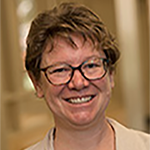
Mary Marrow
senior staff attorney, Public Health Law Center, MN
WEDNESDAY, 7/22: FUNDING A STATEWIDE FOOD SYSTEMS MOVEMENT THROUGH COVID AND BEYOND: THE KANSAS STORY
Mary Marrow, a senior staff attorney with the Public Health Law Center, has provided legal technical assistance to several food systems initiatives funded by the Kansas Health Foundation for over 7 years. Mary will discuss the impact of federal, state, and local laws and policies on KHF initiatives and the role of legal technical assistance in supporting KHF’s food systems efforts, including KHF’s Statewide Partnership, Healthy Communities, and Food Policy Council initiatives. Mary has been a public interest practitioner for over 20 years, with an extensive background working with diverse clients as a public interest practitioner, focusing on public health, poverty, civil and human rights, and environmental advocacy efforts. She brings this experience to her food systems work in Kansas by actively incorporating equity considerations of how issues of race, class, religion, immigration status, and other classifications impact sustainable food systems initiatives.
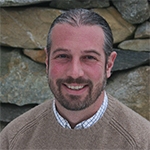
Ian McSweeney
director, Agrarian Trust, NH
MONDAY, 7/13: BARRIERS FOR U.S. FARMERS AND RANCHERS TO ADOPT REGENERATIVE AG PRACTICES: KEY LEVERS & OPPORTUNITIES
Ian McSweeney is a leader in the farmland conservation movement in New Hampshire. He is the director of the Russell Farm and Forest Conservation Foundation. The Foundation, based in New Boston, NH, is focused on assisting landowners and farmers through a customized approach to permanent protection of the land and the importance of farmland soils, secure access and tenure to farmland for farms and farm viability, and sustainable holistic food production. Ian also participates in many farmland conservation, farmland access, and farm and food system initiatives as well as land based education, and is a consultant to several national farmland conservation, farmland investment, and organic food systems organizations.

Malini Ram Moraghan
managing director, Torana Group, IL
FRIDAY, 7/17: DEMYSTIFYING “MARKET RATE” RETURNS IN FOOD & AG
MALINI RAM MORAGHAN is Managing Director of Torana Group, an investment firm that offers business owners alternative capital for responsible growth and equitable exits. Malini has spent years balancing margin and mission, working at the intersection of food & agriculture and “impact investments.” Prior to Torana, she ran a multi-million dollar portfolio of activity through Drawing Board and DAISA Enterprises, advising single family offices, national foundations, regional food system investors and USDA career leaders.
Before she owned farm-grade rubber boots, Malini spent decades in the private sector with McKinsey & Co., AmeriCorps VISTA, and JPMorgan investment banking in New York. She has an MBA from University of Chicago’s Booth School of Business, a BS in Chemical Engineering from Cooper Union and passed Level I of the CFA Exam.
Malini has been nationally recognized as an expert, speaking at the White House Rural Council ROI Summits, USDA’s AgOutlook, SSAWG, SAFSF, OFN, and SARL conferences. Malini served on the Joint Federal Reserve-USDA Publication Advisory Committee. She is currently on the Board of The Common Market, was a founding Board member of Red Hills Small Farm Alliance and a past Board Member of a Feeding America food bank. She is based in Chicago.
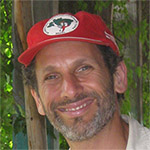
Daniel Moss
executive director, Agroecology Fund, MA
WEDNESDAY, 7/15: LASTING RESILIENCE: RAISING ANIMALS AGROECOLOGICALLY FROM THE MONGOLIAN STEPPES TO THE NAVAJO NATION
Daniel serves as Executive Director at AgroEcology Fund. Trained as a community organizer, he strengthened tenant organizations in public housing in Boston and then lived in El Salvador and Mexico for five years, working in support of social movements defending rights to land and water. In addition to work with the AgroEcology Fund, he collaborates with the Equitable Food Initiative as an on-farm trainer and with Latin American water utilities to strengthen watershed conservation strategies. He holds a Master’s degree in City Planning from MIT and writes frequently on food and water issues for traditional and online media.

Jennifer O’Connor
founder, chief strategist, Guidelight Strategies, CA
MONDAY, 7/13: BARRIERS FOR U.S. FARMERS AND RANCHERS TO ADOPT REGENERATIVE AG PRACTICES: KEY LEVERS & OPPORTUNITIES
After over 8 years working on food security and rural development issues in East Africa, Jenny O’Connor founded Guidelight Strategies, a strategic consulting firm focused on the development and implementation of program strategy and strategic initiatives for a variety of global food/ag, environment and health programs. As the principal strategist and founding director of Guidelight Strategies, Jenny works with innovative businesses, foundations and nonprofits to strengthen organizational capacity and guide them through the development of both their social and sustainability strategies, as well as advising and implementing strategic grantmaking. She focuses her work in the environment, climate change, water and food/ag sectors and advocates for systems approaches to solving root problems across these issue areas. Over the past year, Jenny has been developing a national landscape analysis of the barriers for ranchers and farmers to transition to regenerative agriculture in the US, diving deeply into financial, supply chain and policy barriers and opportunities. Jenny was also selected as an RSF Integrated Capital Fellow for 2019, where she engaged with diverse forms of financial and human capital to support enterprises and strategies that address complex social and environmental problems.
Simran Noor
principal, Noor Consulting, NY
WEDNESDAY, 7/22: COLLABORATING FOR FOOD AND FARM MOVEMENT LEADERSHIP
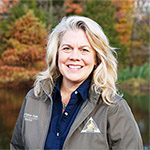
Sara Parker-Pauley
director, Missouri Department of Conservation, MO
THURSDAY, 7/16: FOOD HEALTH, LAND HEALTH: EXPLORING COLLABORATION BETWEEN SUSTAINABLE FOOD AND STATE WILDLIFE AGENCIES
Sara Parker Pauley serves as the ninth Director of the Missouri Department of Conservation since its formation in 1937. The Missouri Conservation Commission announced Pauley’s selection effective November 1, 2016.
A native of Columbia, Pauley received both her law degree and bachelor’s degree in journalism from the University of Missouri – Columbia, and did post-graduate studies in Australia as a Rotary Fellow. She previously served as Director of the Missouri Department of Natural Resources since 2010. She has worked as project manager for D.J. Case & Associates, a natural resources communications firm, and as a deputy director for the Missouri Department of Natural Resources. She has been an instructor at the University of Missouri’s School of Natural Resources, teaching a course in natural resource policy and administration.
Pauley began her professional career as a Policy Analyst with the Missouri Department of Conservation from 1993-1996. Over the years, though her career path varied, it has never strayed far from her personal desire to be engaged in the stewardship of Missouri’s natural resources.

Ronnie Pawelko
senior counsel, Alliance for Justice/Bolder Advocacy, DC
TUESDAY, 7/21: INVESTING IN CHANGE: FOUNDATION SUPPORT FOR LOBBYING AND OTHER ADVOCACY
Ronnie Pawelko is Senior Counsel for the Bolder Advocacy program at Alliance for Justice and is based in AFJ’s Washington, DC office. Through trainings and technical assistance, she provides nonprofit advocacy organizations and foundations with accessible information, resources, and information so organizations can safely navigate complex laws and rules as they pursue systems change. Ronnie received her J.D. from Albany Law School and her B.A. from Russell Sage College. Before joining AFJ, Ronnie was General Counsel at Family Planning Advocates of New York State. Previously, Ronnie served as Health and Human Services Team Counsel for the New York State Senate and as staff attorney for the MergerWatch Project.
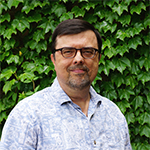
Rich Pirog
director, MSU Center for Regional Food Systems, MI
THURSDAY, 7/23: LEVERAGING LAND GRANT INSTITUTIONS AS A FORCE TO ADDRESS RACISM IN THE FOOD SYSTEM
Rich Pirog is director at the Center for Regional Food Systems (CRFS) at Michigan State University. The Center’s work includes healthy food access and financing, healthy food procurement, farm to school and farm to early childhood education, food policy councils, food value chains and the intersection of racial equity and food systems. From 1990-2011 he was associate director and program leader for marketing and food systems at the Leopold Center for Sustainable Agriculture in Iowa. Pirog’s recent writings and research include structural racism present in the U.S. food system, and building networks that promote sustainable and equitable food systems.
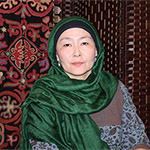
Indira Raimberdy
executive director, Peace Building Center, Kyrgyzstan
WEDNESDAY, 7/15: LASTING RESILIENCE: RAISING ANIMALS AGROECOLOGICALLY FROM THE MONGOLIAN STEPPES TO THE NAVAJO NATION
Indira Raimberdieva comes from the ancient lineage of Saruu people historically inhabiting the Talas region of the Kyrgyz Republic. She currently leads the Peace Building Center (non-governmental organization) the main goal of which is to study and apply practically the potential of traditional spirituality, culture, knowledge and technologies; nomadic eco-mentality; and natural landscapes of the local communities in combination with the positive modern technologies for provision of dignity and prosperity in the life of indigenous peoples of Pamir, Tien-Shan and Sayan-Altai biocultural region. She is a graduate of the Faculty of International Relations of the Kyrgyz-Russian Slavic University (Bishkek, Kyrgyzstan) with a degree in international relations and political science majoring in inter-ethnic conflict management. Indira has 15 years of hands-on experience in inter-ethnic conflict management and preventive development of local communities with high conflict potential; 21 years of work in local community empowerment; and 13 years of practical work in the field of exploration of the potential of traditional culture-spirituality and values-based approaches in local community development, as well as application of traditional spirituality, culture, knowledge and technologies in existing social systems.
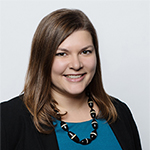
Amy Saltzman
program officer, environment, Walton Family Foundation, CO
MONDAY, 7/13: BARRIERS FOR U.S. FARMERS AND RANCHERS TO ADOPT REGENERATIVE AG PRACTICES: KEY LEVERS & OPPORTUNITIES
Amy is a program officer for the Walton Family Foundation’s Mississippi River initiative. In this role, she works with grantees to improve water quality in the Mississippi River basin by expanding the use of conservation practices in conventional agriculture systems. WFF’s Mississippi River strategy focuses on aligning policy and market incentives to encourage farmers to adopt practices that improve water quality, build soil health and reduce pollution across the basin, while continuing to meet the growing demand for food. Prior to WFF, Amy managed an international agriculture and nutrition project, HarvestPlus, at the International Food Policy Research Institute. Amy also worked as an ag policy coordinator at the Rural Coalition and was a Fulbright fellow in Malawi, where she studied smallholder farmer behavior change. Amy grew up on a farm in southwest Iowa. She has a BA in government and development sociology from Cornell University and an MPA from the University of Colorado.
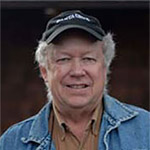
Bob Scowcroft
trustee, Nell Newman Foundation, CA
TUESDAY, 7/14: REPORTING ON SUSTAINABLE AGRICULTURE IN RURAL AMERICA DURING COVID-19
BOB SCOWCROFT has successfully transitioned from a “retirement” state of mind into a more active composition of consultant, volunteer, and advocacy-oriented activities. He currently serves as a trustee of the Nell Newman Foundation, Inc., and sits on four nonprofit advisory boards. He previously served as executive director of the Organic Farming Research Foundation (OFRF), a national organization based in Santa Cruz, CA. The organization was co-founded by Bob and two certified organic farmers in 1990. In the nearly twenty years Bob directed OFRF, it awarded more than $2,400,000 in support of more than 320 organic research and education projects. During Bob’s tenure, OFRF had an active policy, research, and publishing program, and it disseminated information on all sectors of the organic product industry to the public at large. Bob averaged 200 media interviews and more than 15 conference presentations on all subjects “organic” annually. He resigned and retired from OFRF at the end of 2010. Prior to working for OFRF, he was the first full-time executive director of California Certified Organic Farmers (1987-1992); before that he served in the Friends of the Earth’s San Francisco office as their national organizer with a primary focus on pesticide reduction and organic farming advocacy (1979-1985).

Farzana Serang
executive director, Castanea Fellowship, CA
WEDNESDAY, 7/22: COLLABORATING FOR FOOD AND FARM MOVEMENT LEADERSHIP
Farzana brings more than 15 years of experience in leadership development, food system innovation, racial equity advocacy, philanthropy, and community development to her role as Executive Director of the Castanea Fellowship.
Most recently, Farzana led the Multicultural Fellowship at The San Francisco Foundation, a program that has cultivated leaders of color in philanthropy for nearly thirty years. Prior to her time with the Foundation, she was the first Executive Director of the Cooperative Food Empowerment Directive (CoFED). While there, she deepened CoFED’s impact and infused racial equity as the driving principle of the nonprofit’s work. Prior to CoFED, Farzana cultivated her organizing, management, and public policy skills at PolicyLink, where she managed the Civic Engagement Learning Year, a multimillion-dollar initiative that networked W.K. Kellogg Foundation grantees committed to advancing democracy. Alongside her commitment to equity in her professional service, she is dedicated to fostering food equity in her community, as a board member of Sustainable Economies Law Center and an active member of the Oakland (CA) Food Policy Council.
Farzana holds a B.A. from the University of California, Berkeley and a Masters in City Planning from the Department of Urban Studies and Planning at M.I.T. She is an alumni of the 2018 Leadership Academy 2.0 at the Aspen Institute, 2016 East Bay class of LeaderSpring, 2015 Uptima Business Bootcamp, and 2015 Cooperative Development Fellowship.
She resides in Oakland, California and if you meet her she’s likely to hug you, just like her Mom taught her.

Kolia Souza
outreach specialist, MSU Center for Regional Food Systems, KS
THURSDAY, 7/23: LEVERAGING LAND GRANT INSTITUTIONS AS A FORCE TO ADDRESS RACISM IN THE FOOD SYSTEM
Kolia oversees the development of a community of practice and technical assistance for local food sourcing and food systems equity under the GusNIP Nutrition Incentive Hub. She also leads collaborative efforts between the Michigan Local Food Council Network and statewide food and health networks to build organizational capacity for executing individual and collective priorities. Prior to joining CRFS, Kolia served as an assistant researcher/project coordinator for Kansas State University Center for Engagement and Community Development. Her research contributed to the Rural Grocery Initiative and the development of the Kansas Healthy Food Initiative. Kolia also served as a statewide food systems consultant where she conducted regional food system research and led statewide food policy council capacity-building efforts. She holds MS degrees in Architecture and Community Development and is completing her Master of Public Health.
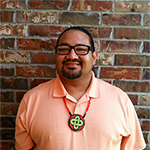
Mekko Tyner
registrar, College of the Muscogee Nation, OK
THURSDAY, 7/23: LEVERAGING LAND GRANT INSTITUTIONS AS A FORCE TO ADDRESS RACISM IN THE FOOD SYSTEM
Mekko Tyner is Muscogee (Creek), Shawnee and Seneca and currently the Registrar at the College of the Muscogee Nation (CMN). Along with his duties as the Registrar, he serves on the CMN Cultural Community Garden Committee and as Project Director for two NIFA grants. Mr. Tyner enjoys teaching and learning about his tribal heritage, especially corn. He has a B.S. in Business Administration from Haskell Indian Nations University and J.D. from the University of Kansas School of Law.
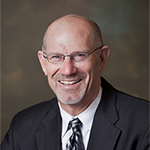
Jeff Usher
senior program officer, Kansas Health Foundation, KS
WEDNESDAY, 7/22: FUNDING A STATEWIDE FOOD SYSTEMS MOVEMENT THROUGH COVID AND BEYOND: THE KANSAS STORY
Mr. Usher’s responsibilities include working with foundation staff to develop program initiatives. He also provides technical assistance to applicants and grantees, reviews proposals and monitors existing grants. Mr. Usher serves as senior program officer for the Foundation’s leadership, healthy behaviors and growing community philanthropy Initiatives. In the last twenty-one years he has supervised a portfolio of nearly 800 approved grants totaling more than $170 million to support the mission of improving the health of Kansans.
A graduate of Wichita State University, Mr. Usher received a bachelor’s degree in psychology in 1982. He has also been active in several volunteer organizations including the Wichita Health and Wellness Coalition, the Kansas High School Cycling League Development Team and the Governor’s Council on Fitness. He is an avid cyclist and a grandfather of 9 beautiful grandchildren.
Jerone Wiggins
director of educational programs and partnerships, Jones Valley Teaching Farm
FRIDAY, 7/24: THE STATE OF SCHOOL FOOD AND HOW WE CAN PLAN FOR THE FUTURE
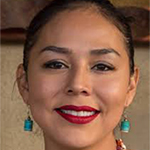
Janene Yazzie
sustainable development program coordinator, International Indian Treaty Council, AZ
WEDNESDAY, 7/15: LASTING RESILIENCE: RAISING ANIMALS AGROECOLOGICALLY FROM THE MONGOLIAN STEPPES TO THE NAVAJO NATION
Janene Yazzie (Dine) is a community activist from the United States and co-founder and CEO of Sixth World Solutions which works with Dine’ (Navajo) communities to develop projects, programs and policies that promote sustainability, environmental justice, and self-governance. She also co-founded the first Navajo Nation community-led watershed planning program for local control in the sustainable management, restoration, and protection of natural resources through youth engagement and community capacity building. Her work has earned international recognition including serving as North American focal point to the UN High-Level Political Forum on the 2030 Sustainable Development Goals (SDGs). Janene is also the IITC Sustainable Development Program Coordinator, New Mexico Navajo-Hopi, COVID Relief Effort Team Leader.
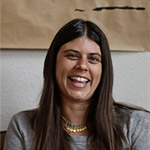
Haleh Zandi
co-founder and co-director, Planting Justice, CA
MONDAY, 7/20: RISK, RETURN, AND IMPACT: FUNDING EQUITABLE FOOD ORIENTED DEVELOPMENT IN THE REAL WORLD
Haleh Zandi is a mother, land-based activist, co-founder and director at Planting Justice, a non-profit organization based in Oakland, CA. For the past 10 years, she has been organizing across prison walls to support people and their families impacted by mass incarceration. Haleh’s approach towards food sovereignty particularly draws critical connections between the United States’ dependence upon fossil fuels within the modern colonial food system and the unjust U.S. militarization of the Middle East/South West Asia. Prior to founding Planting Justice, Haleh worked for Peace Action West in Berkeley and with the Women of Color Resource Center in Oakland. She received her BA at UC Santa Cruz and an MA at the California Institute of Integral Studies in San Francisco. Haleh is of Persian and Norwegian heritage, was born and raised in California, and as a settler in unceded Ohlone territory, she is committed to honoring Indigenous leadership, particularly through the Sogorea Te Land Trust.
